
Food + Sato Takeru = watch. Voila!
Akiyama Tokuzo (Sato Takeru) is a good-for-nothing young man who loses interest in things quickly and creates trouble for his family. He is married off to a merchant household in Sabae to teach him discipline, and he and his wife Toshiko (Kuroki Haru) get along well. However, Tokuzo soon realises cooking is his passion and leaves the family to master the craft in Tokyo. Despite the hardship and humiliation he suffers, Tokuzo is determined to become the best cook in Japan…
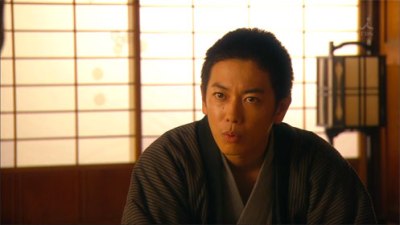
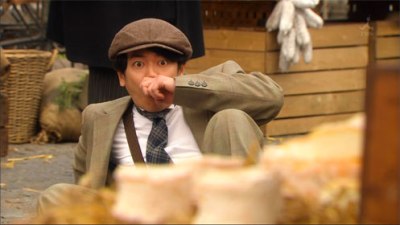
I don’t generally watch currently airing dramas, so I’m always playing catch-up. Lately, this streak of “better late than never” is working very well for me and I’ve been able to find quality dramas from recent years that have ticked a lot of the right boxes for me. It’s always a pleasure to (re)discover actors and know that they have been worth their salt in the projects they picked, and even more so, that those projects have been worth every inch of the hype they received. Such is the case for Tenno no Ryoriban. When it first aired, I didn’t care much for it and almost didn’t recognise Sato Takeru in that crew cut. But now that I’m determined to work through his filmography, this drama became like a “must-watch”, for I was also curious to see just how good he was – Sato won acting awards for his role here, and the drama also garnered several other accolades and was well-received by the audience.
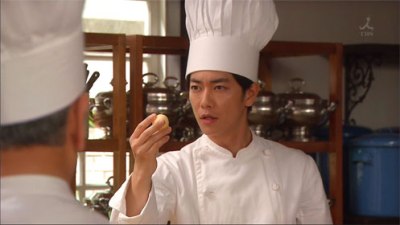

The drama is based on a novel of the same name by Sugimori Hisahide, which depicts the life of imperial chef Akiyama Tokuzo, who served two Japanese emperors, Taisho and Showa. Interestingly, he was born Takamori Tokuzo, so he took on the Akiyama surname when he married into the wealthy Akiyama family of Sabae in Fukui prefecture. Akiyama was somewhat of a legendary figure in Japanese history, for he was only 25 years old when he became Emperor Taisho’s master chef, and was influential in spreading French cuisine in Japan. Apparently, he was known as the “Japanese Escoffier”, and if you know your food, you’ll know how high a regard that is. Akiyama worked under Escoffier himself in Paris and later on also travelled widely to study the cuisines of other countries. He retired at the age of 83 in 1972 and died two years later. Such a remarkable figure was prime material for television, so his life and achievements were adapted into a novel, a few TV series and also a TV film. The 2015 drama tweaked some details, such as preserving the Akiyama name in another way or changing Toshiko’s occupation. At 12 episodes, it was a tad longer than the usual fare and I had wondered about the pacing, for half of the drama was spent on the few years before Tokuzo went to Paris, but I needn’t have worried. The drama made solid use of every minute of air-time and never felt draggy because each episode packed a punch and knew how to keep the viewer constantly engaged.


I’ve always liked food dramas as something about them goes to the core of the human psyche. Food is such a strong unifying (and sometimes divisive) thing, and the cuisines of the world are reflective of the people, history, cultures and traditions that shape them. A good food drama is more than just about the chef, and this is so for Tenno no Ryoriban as it goes beyond tracing Tokuzo’s journey to becoming a renowned chef and builds a solid world to draw viewers in. It is true that Tokuzo made it to the highest echelons of the culinary world by sheer hard work and determination, with lots of creativity and a dose of aggression, but all that could not have been possible without the many people helping him and giving him the support and push he needed. The drama showcases that beautifully with the depiction of a very lived-in world, from Tokuzo’s family in Fukui and his Tokyo chef colleagues, Tokuzo’s makeshift “family” in France, and then back again to Tokyo with Toshiko, their children, friends and mentors. These bonds were weaved so strongly throughout the drama that it was impossible not to get the feels (and I certainly felt their impact big time), and beyond wanting Tokuzo to succeed, I also wanted the other characters to get their day in the sun and overcome their personal battles. Each important character was so well-drawn that no matter the size of his role, it was easy to understand how he or she factored in Tokuzo’s growth and the web of relationships that spanned more than five decades.


At its core, Tenno no Ryoriban was about relationships – Tokuzo’s with his family and friends, with cooking, with colleagues and enemies, and with himself. He started out as a good-for-nothing layabout who was the butt of jokes in his village in Takefu, and his family despaired of him ever coming good. Cooking inspired him to aspire for the better, and to make something of himself. For the first time, he wanted to persevere in making his elder brother Shutaro (Suzuki Ryohei) proud, and that brotherly affection would be a driving force to keep him going every time Tokuzo thought of giving up. I really enjoyed just how strong this bond was – no jealousy, no petty fighting, only lots of encouragement and support, and the appropriate dose of wisdom to keep Tokuzo’s temper in check. Shutaro could never fulfil his own dreams of becoming an outstanding lawyer in service of his country due to his illness, but it was heartwarming and sad at the same time to see how much he pinned his own hopes on his brother and took delight in Tokuzo’s every success. And although Tokuzo felt the burden, he also felt pride in being able to do something for his brother. I also love the bit where Tokuzo’s mother came to visit him in Tokyo and gently reminded him that fortunate people like him should work extra hard. Mom was always supportive and her words became motivation for Tokuzo to persevere in the face of difficulties. Dad had a foul mouth but a heart of gold and always wanted the best for his children, even if Tokuzo frustrated him to no end.
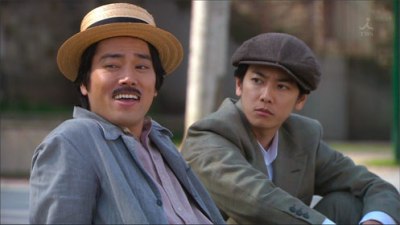

Also heartwarming was Tokuzo’s relationships with his colleagues, first at Kazoku Kaikan, then at the little diner Banzai, in France and finally in the imperial kitchen. I love that these friends were his pillars of support through the years, even though stuff happened and they hadn’t always kept in contact. I thought the redemption of Shintaro (Kiritani Kenta), Tokuzo’s erstwhile cook friend who had artistic ambitions but never made it as a painter, was really nicely done. Shintaro was pretty much a good-for-nothing who leeched off Tokuzo while they were in Paris, but he wasn’t a bad sort at heart and was generous with his time, especially when Tokuzo needed help looking after his children when Toshiko was ill and he still had to work. So Shintaro stepped up and made himself useful around the house, and it was lovely seeing Tokuzo, in an understated way, acknowledge that Shintaro had been a great help during that trying time, and Shintaro glad in the knowledge that his efforts were for once appreciated. Ditto with Tatsukichi (Emoto Tasuku), who was really a decent guy at heart and spent his life feeling guilty that he’d contributed to getting Tokuzo kicked out of Kazoku Kaikan, and then stepping in unreservedly whenever Tokuzo and his colleagues needed help with food preparation. It was bittersweet seeing how Tatsukichi kept trying to apologise to Tokuzo, only to realise some things are too late when they’re not said in time. I think Tokuzo knew, but didn’t want to make a fuss and make Tatsukichi feel bad again because he understood Tatsukichi hadn’t done it out of malice.


And how much do I love that Tokuzo’s mentor, Usami-san, was played by Kobayashi Kaoru? It was great to see him in yet another chef role, and to mentor the young Tokuzo and instil in him the right attitude towards food and cooking. I really enjoyed how that relationship was depicted and was happy to see that sustained well into Tokuzo’s later years. Usami-san always managed to get Tokuzo to reflect on his actions and do the right thing, and taught him how to appreciate and respect food, and the customers he was serving. For a chef should not only care about his dedication to his craft, but also the ingredients he uses, and the people who will ultimately enjoy his creations and understand the effort he has put into preparing them. Once Tokuzo got that right – and it took him quite a while, but Usami-san never gave up – it was so much easier for him make his mark and I’m glad that Usami-san’s teachings allowed Tokuzo to build proper foundations on which to expand his potential. I also love that Usami-san was never a mentor jealous of his protégé’s success, but was always supportive and ready to lend a hand professionally or otherwise. I also liked how Tokuzo handled his relationship with Miyamae-san, an established senpai cook at the imperial kitchen, and the rest of the imperial kitchen staff. It showed a maturing Tokuzo able to stamp his authority as the new head chef, yet appreciate all that Miyamae-san stood for.
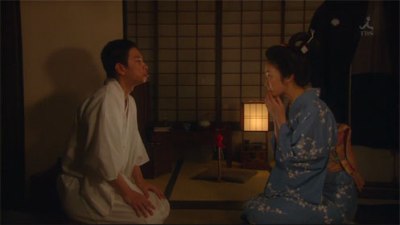

But the relationship I love most is that of Tokuzo and his wife Toshiko. The trials and tribulations they went through and how they each overcame them felt logical and natural – you could understand, for example, why Toshiko chose to end their marriage so that Tokuzo could pursue his dreams unencumbered, and why Tokuzo would go all out to preserve their marriage despite strong opposition from her parents and the possibility of giving up his chef dreams. While Toshiko’s character was self-sacrificing and she was the sort to do her utmost to support her husband without complaint, there was no noble idiocy on her part because every decision she made regarding Tokuzo showed her love for him and her belief that he deserved every opportunity to further his cooking ambitions and skills. She never nagged him, and tried to be understanding of his disappearing behaviour even if it was clear she had gotten the short end of the stick when it came to their first marriage. I have to say I enjoyed their re-marriage more, as it was a slightly more equal relationship even with the clear division of roles. And it was adorable how Tokuzo was eager for Toshiko’s opinion as he worked on the celebration menu. However, the first part of their relationship was essential for character building, especially on Tokuzo’s part, and I was glad to see that even when they were apart, Tokuzo often wondered how Toshiko was doing and genuinely felt bad he wasn’t able to be a good husband to her.


I am frankly amazed by just how she and Tokuzo managed their family of five after their re-marriage, and the level of trust and understanding it took, especially from her, to ensure he was able to dedicate himself to work. Two incidents stick out: Toshiko insisting on keeping Tokuzo away from her when she was sick even when he wanted to take care of her, because she understood that hygiene was of the utmost importance for a chef working in the imperial kitchen and he shouldn’t be catching germs from her; and Tokuzo running a soup kitchen to serve the victims of an earthquake when he should have first checked on Toshiko and the children – the worry each felt for the other did not stop them from doing their respective duties, and the feels that came when Tokuzo realised Toshiko and their children were safe and how their son finally understood why his job was so important were incredible. The latter was one of the best segments of the drama and I love the tumultous, yet heartwarming emotions it evoked. Toshiko’s understanding, love and trust in Tokuzo were so crucial to allowing him to blossom into the person and chef he became, that it was incredibly sad to see him so heartbroken without her after she died. Even then, her advice to him on his anger management issues continued to help him keep his temper in check at key moments, and he was able to avoid certain career-killing pitfalls and keep his neck intact (the bells were a lovely bit of symbolism the drama used throughout, with great effect towards the end). I think the drama made a very smart move by not making Tokuzo remarry – in real life, Akiyama remarried a year after Toshiko’s death and had two more children with his new wife. In this way, Tokuzo and Toshiko’s love story was preserved and it is always nice to have a male lead who appreciates the sacrifices his wife made for him and who continues to love her long after she has left the world.
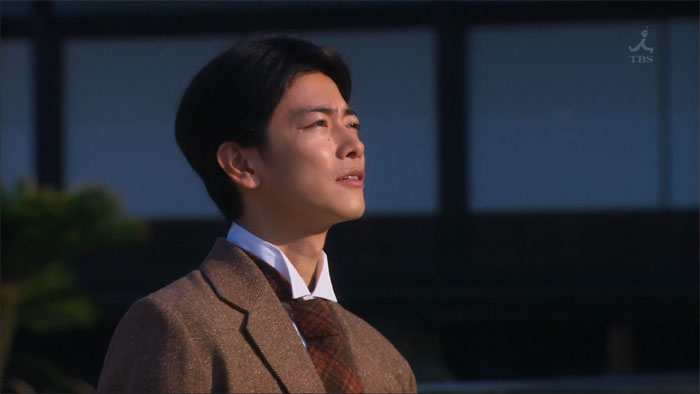
Acting was superb on all fronts, and I really enjoyed every performance. Sato Takeru was outstanding in a role that was so different from what he’d done previously. I’d been used to his mellower roles, so this came as a real surprise and it took me a while to get used to it. Tokuzo was loud, shouty and had a temper a mile long. His reaction to anything was extreme, such as his introduction to Western cooking and his unbridled joy and appreciation at the deliciousness of the cutlet Tanabe-san had him try. In time, I got used to Tokuzo’s outsized personality and it was entirely credit to Sato that he made all of Tokuzo’s mannerisms and loudness believable and true to character – it is all the more amazing when Sato confessed Tokuzo was so different from his usual self. You could really believe that Tokuzo was the village idiot, the rash man-child who was suddenly enamoured of cooking, the hyper Petit-kou keen to make an impression, the hot head struggling to control his temper and aggression, the confident and steady young man who was sure of his mark in Paris, the new imperial chef ready to make a difference in his career and life, and so on and so forth. At every major change in Tokuzo’s life, Sato stepped up so well that the transition was seamless and utterly believable, even when he had to slap on a moustache and age himself to portray Tokuzo in his later years. I was really impressed by how he’d inhabited every aspect of Tokuzo’s character and every bit of growth he went through, and how he was Tokuzo every step of the journey. I could not imagine any other young actor portraying Tokuzo to such an extent, and it was easy to see why Sato won an award for this role. I especially love his knife skills (impressive stuff with the potatoes) and that he hadn’t used a stand-in for the cooking scenes because he’d taken cooking lessons for months prior to filming. I respect dedication to the craft and Sato’s efforts paid off beautifully.


I loved Sato’s chemistry with his co-star Kuroki Haru, who played Toshiko. Slow-burn sparks are the some of the best variety of romance, and the love story of Tokuzo and Toshiko was one for the long haul, a contrast to Tokuzo’s fiery temperament but very fitting for Toshiko’s gentle and patient demeanour. Initially, I wasn’t used to Kuroki Haru in the Edo get-up and thought it did her a disservice as it made her look plain – she is actually really pretty – but Toshiko’s goodness just shone right through and over time I got used to her look and really enjoyed her portrayal of the character. She imbued Toshiko with kindness and old-world charm, patience and gentleness that were seemingly out of this world, and hidden steel that one would not have imagined for a soft-spoken young woman who had grown up sheltered most of her life. I really liked how Toshiko made a career for herself as a midwife and guided her children with wisdom and understanding. She was a woman of her times, and yet she broke the mould in ways that she knew how. Kuroki also won an acting award for this role and it was totally deserved, for she and Sato complemented each other well and they were both very generous actors, their on-screen chemistry and sparks unfolding much like how Tokuzo and Toshiko’s relationship developed.
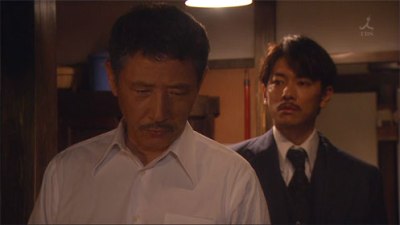
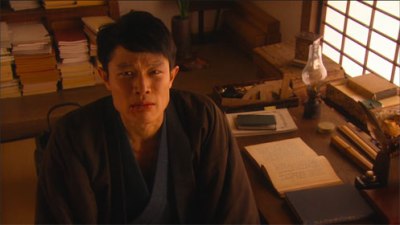
I hadn’t realised Kiritani Kenta was in this, and was pleasantly surprised by his Shintaro. I think Kiritani works best for me in secondary roles, where he isn’t expected to carry the burden of the drama, and where he is not required to angst more than necessary. Shintaro was mostly flighty and aimless except for a desire to be a painter, but he was also happy-go-lucky and was a fairly endearing character despite his flaws. Kiritani did well with the character and was fun to watch, and I laughed at his constant reference to Tokuzo as “omae-san”. Emoto Tasuku was solid as Tatsukichi, earnest and decent at heart, and perfectly normal in feeling the prick of inferiority and jealousy over Tokuzo’s obvious talent. To his credit, Emoto never made Tatsukichi detestable, just a character to be pitied in his moment of folly, and it was lovely to see how the three friends stuck with one another through thick and thin. Kobayashi Kaoru was excellent as usual as Usami-san, a sterner and more mentor-ish character than Master, but evoking lovely memories of his Shinya Shokudo days all the same. He voiced what all of us had been thinking when he told Tokuzo plainly that “your wife was quite a woman”, and so she was. Suzuki Ryohei lost weight for his role as Shutaro, and it was really hard to watch as he fought a losing battle with tuberculosis. It got to a stage where I wanted Shutaro to spend more days in the sun than in the room, and stay alive till the end of the drama. I thought he did really well as the ever supportive elder brother – what a contrast to his muscle-filled role in season 2 of Seirei no Moribito.


The drama was filmed in various locations including Fukushima, Ibaraki, Kobe and Okayama, and also went to France for the Paris segment. I enjoyed hearing the dialect used in the Kinki region, the use of the suffix -yan, and the enthusiastic way Tokuzo would say “hai~!” It was just so singsong and happy, haha. I can’t vouch for the authenticity of the French spoken by the mostly French cast in Paris (I definitely needed subtitles for the French spoken by the Japanese actors), but the English towards the end was meh and I wish the drama hadn’t shown Tokuzo writing in fluent English (thanks to having travelled a lot with the Emperor) but speaking like he’d never uttered an English word in his life. But that’s a nitpick I’m happy to overlook, because the drama was just so well-made overall. The theme song 「夢見る人」 was evocative and melancholic, a nod to the era depicted in the drama. The cooking scenes were well done and all the food prepared looked so yummy and gorgeous. I especially liked all the little creative ideas Tokuzo came up with for Toshiko when she was ill and couldn’t get much food down in her. Cats also featured in a few episodes, which was great, especially when one of them gave Tokuzo the paw slap for whining so much!


Overall, this is an excellent drama to sink your teeth into and spend some quality time with. It’s so nice to watch a drama and be assured that it is worth its hype and everything it stood for, from the acting to the production values and the messages it sent. I really enjoyed every minute of Tenno no Ryoriban, and more than once found myself chopping onions at the more emotional scenes. I am now convinced Sato Takeru delivers no matter the role, and am really glad that he was cast in this drama, for he made the role of Tokuzo his own and so much more. I will not hesitate to recommend this to anyone in need of a fantastic drama filled with goodies, as a showcase of what Japan can offer beyond the steady production of procedurals. For Tenno no Ryoriban gets to you right in the gut and warms the cockles of your heart. The feels, they are so worth it.
junny@3.21am

Reblogged this on mamabatesmotel.
LikeLike
If only it was end with eps 11, because it’s hard to watch the 12th eps. I don’t know how it happened in real life, but why do they have to make it like that?
I felt decieved when I watch this dorama. I start it expecting to experience a food drama like Osen, Ando Natsu, or even Shinya Shokudo, but end up shouting “Nii-yan!!!” from start to end.
And I think Kuroki Haru look pretty in period costume. She look so Japanese! Don’t get me wrong, it’s a compliment. If in chinese drama there what’s it called “ethereal/classical beauty” for actress who suit wuxia/xianxia look, I have it for j-actress too since as of late I have new fondness on jidaegeki.
I don’t remember have I watched her in anything before, but this seeing her in this drama make me want to see her in Sengoku or Heian setting!
But I’m not fond on how they age-up Sato Takeru. Jdramaland still has long way to go in make up department. The only one who looks good I can think of is Kenichi’s Kiyomori in Taira no Kiyomori (taiga), I don’t know whether it’s the make up or his expression, but he looked so convincing as older Kiyomori.
LikeLike
Yeah, I kinda agree with episode 12, but still the rest of the episodes were wonderful and totally worth the watch. I think I rather liked Sato Takeru’s “mature” look up to episode 11 (see the last screencap), but I guess after that in episode 12, it did take some believing cuz he just wasn’t old enough anyway.
Agree that Kuroki Haru was so pretty in the kimono! And yes, she did look like one of those old-school Japanese beauties from a long ago era. If you want to watch more of her in jidaigeki, she was also in Sanada Maru, and this year’s Segodon with Nii-yan.
LikeLike
Seriously, in eps 11 they way he potrayed his lost after she died was beautiful. It will be better if they put some extra minute and show how the bell become his emotional support and then his retirement. Not only his questionable english speaking but also they way he “interact” with american officers was hard to watch and such a let down.
I do plan to watch Segodon after it’s finish but nobody can convince me to watch Sanadamaru. I’ve learn my lesson after Ryomaden. Even my love for Masaya couldn’t help me in fooling myself to see him as teenager, moreover Sakai. Yes, he’s a good actor but to make him played younger Sanada Yukimura is too much. Sigh, taiga and their tendency of one actor for whole drama.
LikeLike
I agree about ep 11 and thought Sato was excellent in there, I really felt for his character. The bells bit was a really nice touch. But I guess Akiyama’s story isn’t only about his family, but also his status as an imperial chef and those were difficult times during the war. I didn’t like the American officers part too, I try not to think about it, haha. Ah well.
I guess because taiga are so long and probably very expensive to produce, so they try to stick with the actors they have, haha. But it can’t be as bad as Gou, where Juri played a child. Sigh.
LikeLike
I watched Tenno no Ryoriban while it was being subbed. I emailed a former colleague/friend in Japan about it because I was struck by the depiction of the Emperor during WWII. As an American, it always takes me a bit to get used to the different perspective on why that war started and the responsibility taken for its brutality. I just looked back at the email and see he laughed me off because dramas are the realm of housewives. I was struck by how amazing Kuroki Haru was and thought Sato Takeru was good, but overacted here and there, having loved him in Rurouni Kenshin. Did you watch Kuroki Haru in Juhan Shuttai? I really adored her in that show. I agree that she is one of the best young actresses.
LikeLike
Hmm, I had no issues with how it was portrayed, seeing as it was from a Japanese perspective and how they’ve always held the Emperor and royal family in high esteem, and there was bound to be some blind patriotism involved. There always is, in dramas like this. Haha, dramas are not only the realm of housewives! I think your friend was a bit dismissive there.
Kuroki Haru was amazing, and I really enjoyed her performance. I don’t disagree there were certain bits where Sato Takeru may have been a bit over the top, but I attributed it to his character, because Akiyama is so loud and sometimes immature, and completely different from Kenshin. Haven’t seen Juhan Shuttai, but heard it was good. Maybe I should get to it after all.
LikeLike
I don’t really have issues either, but I’m so used to my American-centric view of things that it startled me. It always does and I couldn’t get through Nishijima Hidetoshi’s movie The Last Recipe for similar reasons. I just read a synopsis of Gibo to Musume no Blues and the scriptwriter wrote Tenno no Ryoriban!
LikeLike
Really? Wow, I didn’t realise that. I almost never pay attention to scriptwriters unless they are overhyped or something. Seems she also wrote JIN, which was great, and Mr Brain, which I heard was bad. Ooh, she also wrote Tonbi, I have that on my to-watch list.
I didn’t watch The Last Recipe since I am not a fan of Nino. Was it okay?
LikeLike
I didn’t get past the first 1/2 hour of The Last Recipe because of the historical context. Nino plays an arrogant genius chef that can replicate any dish—he was ill-tempered and angsty enough to be convincing. Watched the first episode of Gibo to Musume. It’s an odd one and not the first time I’ve seen Ayase Haruka play a character with low emotional intelligence. I like it though!
LikeLike
Hah, another arrogant genius (insert profession). Good thing I passed then.
Oh, good that you’re liking Gibo to Musume. I saw maybe bits of it and she seemed to be playing one of those robotic career woman roles? LOL. The young actress playing the daughter seemed quite good.
LikeLike
Yes, Ayase is a robotic career woman—-I actually looked for the manga to see if the character was the same way. That stereotype gets played up too much in Asian dramas. The young actress is very strong and not annoying as I sometimes find child actors when they are too hammy.
LikeLike
That’s why I was going to skip the drama cuz it involved kids. I almost always avoid kid-related dramas, especially if they’re the focus. But then Sato Takeru joined, so I have to watch it, haha. How’s he doing?
LikeLike
Sato Takeru hasn’t had many scenes so I’m not sure how he fits in yet, but I anticipate good chemistry with Ayase. There is a young girl actor in Shikaku Tantei Higurashi Tabito too. I don’t find her annoying but I thought I should warn you that she is a prominent part of that story. Actually, I have liked several child actors in Asian dramas, much more so than in Western shows.
LikeLike
Just checked the filmography of the young actress in Shikaku Tantei. Quite impressive! I’ll take your word for it that she’s not annoying. I think I’m okay with child actors if they’re not irritating or bratty in the drama. Which child actors have you liked?
LikeLike
The more I watch Shikaku Tantei, the more I want to figure out what’s going on but I’m pretty weirded out. Some of the stuff in that show is extreme, including what happens to her. As for your question, I liked both the girls who played the young versions of Haru and Anne in their asadoras. All of three children in What’s Wrong With Secretary Kim were really good, especially the young Miso and young Yeong Joon. The child in the k-drama I Have a Lover was excellent too.
LikeLike
Suzuki Rio is a very good child actress and I liked her in Asa ga Kita as well. The young actor who played Shun in BG was also pretty decent.
Let me know how it goes with Shikaku Tantei, it sounds more intriguing by the minute!
LikeLike
I finished Shikaku Tantei. I’ve never watched Tori Matsuzaka before and found him quite effective as a detective who uses only his eyes because he has no sense of hearing, smell, touch or taste. He might have done a better job of depicting that deprivation but overall he was very good at making me cheer for him while questioning his motives. The cast overall is very likable and Tabe Mikako as the romantic interest (very little of this) is an actress I actually enjoy rather than tolerate. The violence of the show crept up on me but I was too far into the mystery to let go, so I was cringing at several turns. It was also an incredibly funny watch, so that helped balance things out.
LikeLike
Sounds like a good watch then! Glad you enjoyed it. I’ve only seen Matsuzaka Tori in the film Her Love Boils Bathwater, where he was pretty decent. He was also in the previous asadora Warotenka, if you are interested in trying another one.
Yay, you like Tabe Mikako as well. She’s also in Shikaotoko Aoniyoshi, how are you doing on that one? Also, I recommend this cute SP she’s in with Takahashi Issei: Watashi ni unmei no koi nante arienaitte omotteta.
LikeLike
I finished Shikaotoko Aoniyoshi and I enjoyed her in that drama too. I liked what a dork Tamaki Hiroshi was in Shimaotoko! Ayase’s earnest, nerdy love for him helped erase my some of my lingering bitterness from Kyou wa Kaisha Yasumimasu. They have an easy chemistry together. I actually started Her Love Boils Bathwater and will pick it up again.
Started Survival Wedding—my feelings about Haru are mixed as I expected.
LikeLike
Yay, so glad you liked Shikatoko Aoniyoshi, it’s one of my favourite dramas and I just find how everything came together so cleverly done. Tamaki and Ayase were great together there.
Yeah, Haru is a bit hit or miss for me, mostly miss. She was okay in BORDER though. I can’t believe they gave Iseya Yusuke that coconut hairstyle.
LikeLike
Her character keeps referencing his terrible hair so I think there may be a non-coconut hair, romantic scene somewhere in the future. Ha ha! I haven’t gotten far and while I find the whole got to get married before 30 thing so anachronistic, it is also a very funny show. His character is essentially teaching her to love herself. It’s terrible of me, but I look at her face often and vacillate between thinking she’s too plain or just pretty enough. It’s distracting and her method of acting is a bit frumpy, if that makes sense.
LikeLike
Are they end game then? Cuz if this ends up being another Kyou wa Kaisha Yasumimasu, that would be meh. I think Haru’s average in terms of looks, but maybe with the right styling she might shine more. Interesting you said her acting is frumpy… any examples?
The one “must be married before 30” drama I enjoyed was Over Time, but that was such an oldie.
LikeLike
I guess my example would be this drama! She was guilelessly confident in Asa ga Kita, so perhaps it is unfair of me here and she is supposed to be frumpy. My first take on Sayaka was that she is supposed to be an average woman that does not value herself enough, but is not necessarily unappealing. She is dressed in long hemlines and multiple layers (probably symbolism) but she still looks kind of cool to me in certain scenes. Maybe she will evolve and as she grows more confident she will wear less layers—as for now, I can’t decide from one scene to the next about this character.
What are you watching?
LikeLike
Well, I suppose that indecision is what will keep you watching. I just wish it wasn’t the woman who needs makeover and self-love tips all the time. Hopefully the rest of the drama is done well and the character growth is believable.
I’m on the last legs of Hanzai Shokogun, a procedural on the criminal syndrome. Bit on the heavy side, and there’s a season 2 which is supposed to be very good. Also 5 episodes into Good Doctor, which is quite engaging despite all the kids, haha. Fujiki Naohito has such a yummy hairstyle there and is pretty hot as a doctor.
LikeLike
I wasn’t able to watch too much of the original Good Doctor (watched for Joo Sang Wook, turned off by Joo Won). Not sure I can watch another version. What do you think of the Code Blue series? It has been so successful that even the movie is a theatrical hit.
LikeLike
I loathe Joo Won, so I didn’t bother with the original. I do like Joo Sang-wook though. The Japanese version is quite palatable and most of the actors are likeable, even Yamaken.
Didn’t bother with Code Blue because it’s got a bunch of people who can’t really act. I can’t stand Yamapi and dislike Aragaki Yui as an actress. I think I saw bits of the first episode of season 3 (it was showing on TV), and was turned off by Yamapi’s stone face. Pretty sure Japan has had better medical dramas.
LikeLike
Yamapi and his dead eyes! Yet he has a lot of successful projects. I predict aging may be a struggle though. Back to Survival Wedding–I’m still watching because it’s funny. If I think about it, I’m drawn first to the humor in J-dramas and second to the emotional payoff (meaningfulness) which is not overwrought like some K -dramas. I loved the wit and banter in Saigo Kara Nibanme no Koi. Heck, I can even tolerate a high school drama or movie if the humor is good!
LikeLike
You know how it is, the talentless hacks always manage to find some big agency to support them for god knows what reason. I swear the bulk of Johnny’s artistes can’t act for toffee, yet they’re the ones snagging the lead roles and hot projects.
I generally like the humour in J-dramas, so if Survival Wedding does that well, keep watching! Saigo Kara Nibanme no Koi was so good with the banter, and I really enjoyed the chemistry between the leads! Not often we get a rom-com with leads in their forties or fifties.
LikeLike
Saigo Kara Nibanme no Koi is one of my very favorite series. The breakfast scenes with Nagakura and Chiaki bantering away are so well done. I dragged my family to Kamakura last summer because of the show. Sadly, I read that the actor that played Shinpei has been very ill.
The Johnnys are starting to really freak me out as they age but try to style themselves as 20-something idols. I’m sure a few are actually still in their 20’s but the ones in their 40’s with their creepy dating and pedo scandals need to get married and move on.
LikeLike
Yes, it’s really sad about Sakaguchi Kenji (the actor who played Shinpei) but at least he’s getting treatment for it now. Hope he gets better soon. I haven’t seen season 2 of Saigo Kara, have you seen it? Was it as good?
The bulk of the Johnny artistes are a waste of space and yes, the age thing + scandals really show them up to be who they are = empty vessels. But I guess those are the ones who hang on to their two-bit fame even though they’re past their sell-by date. SMAP looked terrible in their later years, and they should have disbanded long before 2016.
LikeLike
Viki used to have both seasons of Saigo Kara with the SP tacked on to one of the seasons. The slow romance is the through line although it seems to go forward and then backward a bit and then forward. The second season is still very funny and I found it satisfying to follow everyone a bit further on their path. There is an actual “conclusion” in season 2.
I can’t decide about the hair when I look at J shows. On the one hand, the styles look a little dated but on the other, there’s usually a LOT of it and I kind of like that. But the middle-aged guys trying hard with idol hair is so sad. I barely register who SMAP is (Kimutaku?) but I think I’ve seen some of them in dramas and have not been terribly impressed.
LikeLike
Good to know season 2 of Saigo Kara holds up. I’ve only seen until the SP, which was also quite delightful. Looking forward to more of the leads’ hilarious banter.
I can never understand the idol concept and their fashion, but I guess they have to cater to a certain demographic and sell that romantic (single) image. There are fans who will get seriously upset if their idols are dating or married. Yes, SMAP was Kimutaku’s group and most of them were blah in dramas – Kusanagi Tsuyoshi is a somewhat decent actor, and Kimura is generally passable, but the other three are best forgotten. Arashi too should stop acting, as should Kat-tun and other ridiculously-named groups.
LikeLike
BTW, I’m trying to pace myself with Gibo to Musume because it’s good and keeps getting better. Takenouchi Yutaka is hitting all the right notes as the dad. Sato is still a mystery to me but is becoming more prominent. I know it’s based on a manga but it’s fresh to me and I’m so glad it’s being subbed. I just finished Episode 4 and subs are up to Episode 6, nearly at pace with the airing of the drama.
Idols acting in dramas rarely work for me!
LikeLike
I haven’t started Gibo to Musume, waiting for it to finish so I can marathon. Hope Sato’s character doesn’t turn evil! I also really need to finish Asa ga Kita so I can start Hanbun, Aoi.
LikeLike
Is Hanbun Aoi another asadora? My friend in Japan that dismissed dramas as the realm of housewives also called asadoras a form of cultural propaganda. I almost didn’t finish Asa ga Kita because of the inevitable parting of Shinjiro and Asa.
LikeLike
Hanbun, Aoi is the currently airing asadora. It stars Nagano Mei as the heroine and Sato Takeru as her childhood friend and potential love interest. Hahah, your friend is really cynical. I’d say taiga are more cultural propaganda than asadora, though I can see why he thinks that way cuz some asadora do have that vibe. I looked up the history behind Asa’s character and knew the real Asa left her husband, and I saw some stills of Shinjiro dying(?), so I’m kind of prepared for the eventual parting.
LikeLike
I guess I’m still on topic if I’m discussing Sato—I haven’t gotten there yet, but he has a lot to do starting Episode 7. I see that he is impressing fans with a character so different from the one he is portraying in Hanbun, Aoi. Was poking around IG and saw some cute clips of him promoting Gibo to Musume with Ayase Haruka on variety shows. The two of them eating and laughing and another of him tying her shoelace.
LikeLike
Anything about Sato Takeru is always on topic 😛 I like how he’s trying new roles and not getting typecast in one. One reason why I was happy about Hanbun, Aoi is cuz he hasn’t done many romantic lead roles, so I wanted to see him be one and enjoy all that angst, haha. He was in Real (film) with Ayase previously, so they know each other and it’s nice to see them comfortable with each other.
LikeLike
Sato Takeru is looking very handsome in Gibo to Musume. His hair is black and a little long, much like the press conference photos but a little wavier.
LikeLike
Took me a while to get used to his styling in Gibo to Musume, but in recent stills he’s been looking very good. He’s also had good hair in Kanojo wa uso wo aishisugiteru, and the stills I’ve seen of Hanbun, Aoi.
LikeLike
In the earlier episodes, which are some years ahead of the current time, his hair was a burnt orange-brown and not so attractive. Black hair looks great on him.
LikeLike
Agree, black hair looks good on Sato. In terms of hairstyle, I think the Kano Uso and Hanbun, Aoi ones edge it for now, although I need to see the Gibo hair in action as well 😛
LikeLike
Is Hanbun, Aoi not getting subbed? What a shame. I looked up his hair in those shows and I have to say the Kanojo wa Uso hair reminds me of Saito! Hanbun, Aoi hair and Gibo hair both quite nice, but Gibo hair slightly more bad boy.
LikeLike
Hair is good in top banner. Looking at Discord forum and seeing interest in subbing Monte Cristo Haku. I can’t figure out how to like over there. Can only see emojis.
LikeLike
Hanbun, Aoi is being subbed, but quite slowly. I think the subbers are busy, so they’ve only done until week 2. I don’t expect it to be completed anytime soon. Noooo, Kano Uso hair is not Saito! *kicks Saito to Timbuctoo* I agree Gibo hair is quite bad boy, does that fit his character there?
For Discord, if you mouse over to the right of the post you want, there is a smiley face there where you can insert emoji. I think that’s how you like the post.
LikeLike